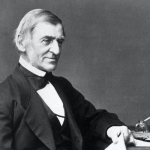Bulkeley, Hunt, Willard, Hosmer, Meriam, Flint,
Possessed the land which rendered to their toil
Hay, corn, roots, hemp, flax, apples, wool, and wood.
Each of these landlords walked amidst his farm,
Saying, “’Tis mine, my children’s and my name’s.
How sweet the west wind sounds in my own trees!
How graceful climb those shadows on my hill!
I fancy these pure waters and the flags
Know me, as does my dog: we sympathize;
And, I affirm, my actions smack of the soil.”
Where are these men? Asleep beneath their grounds:
And strangers, fond as they, their furrows plough.
Earth laughs in flowers, to see her boastful boys
Earth-proud, proud of the earth which is not theirs;
Who steer the plough, but cannot steer their feet
Clear of the grave.
They added ridge to valley, brook to pond,
And sighed for all that bounded their domain;
“This suits me for a pasture; that’s my park;
We must have clay, lime, gravel, granite-ledge,
And misty lowland, where to go for peat.
The land is well,—lies fairly to the south.
’Tis good, when you have crossed the sea and back,
To find the sitfast acres where you left them.”
Ah! the hot owner sees not death, who adds
Him to his land, a lump of mould the more.
Hear what the Earth say:—
EARTH-SONG
“Mine and yours;
Mine, not yours.
Earth endures;
Stars abide—
Shine down in the old sea;
Old are the shores;
But where are old men?
I who have seen much,
Such have I never seen.
“The lawyer’s deed
Ran sure,
In tail,
To them and to their heirs
Who shall succeed,
Without fail,
Forevermore.
“Here is the land,
Shaggy with wood,
With its old valley,
Mound and flood.
But the heritors?—
Fled like the flood's foam.
The lawyer and the laws,
And the kingdom,
Clean swept herefrom.
“They called me theirs,
Who so controlled me;
Yet every one
Wished to stay, and is gone,
How am I theirs,
If they cannot hold me,
But I hold them?”
When I heard the Earth-song
I was no longer brave;
My avarice cooled
Like lust in the chill of the grave.

Comment form: